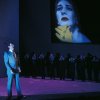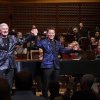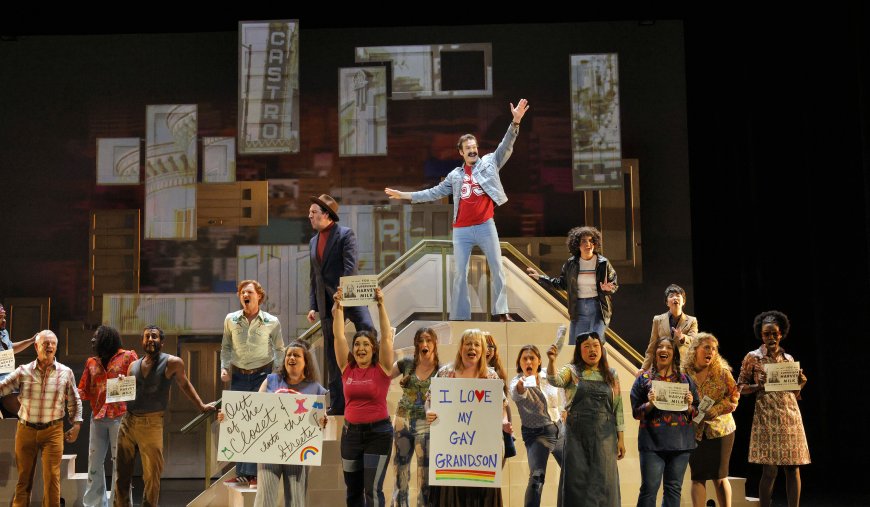
Harvey Milk is back.
No, not the legendary civil rights activist, who was assassinated after becoming the first openly gay elected official in California history, but Harvey Milk Reimagined, a heavily revised version of composer Stewart Wallace and librettist Michael Korie’s 1995 opera.
San Francisco Opera co-commissioned the original, performed here in 1996. Now, three decades later, Opera Parallèle — the local company that has made a mission of staging works by contemporary composers — is presenting the West Coast premiere of Harvey Milk Reimagined as part of a co-commission with Opera Theatre of Saint Louis.
This production, which had its opening performance at Yerba Buena Center for the Arts’ Blue Shield of California Theater on Saturday, May 31, and runs through June 7, comes at a timely moment, when the civil rights of transgender and other LGBTQ people are being challenged in the United States — a contrast to the hope that infuses Milk’s story. The message of the opera is ultimately uplifting, even if the telling is at times harried.
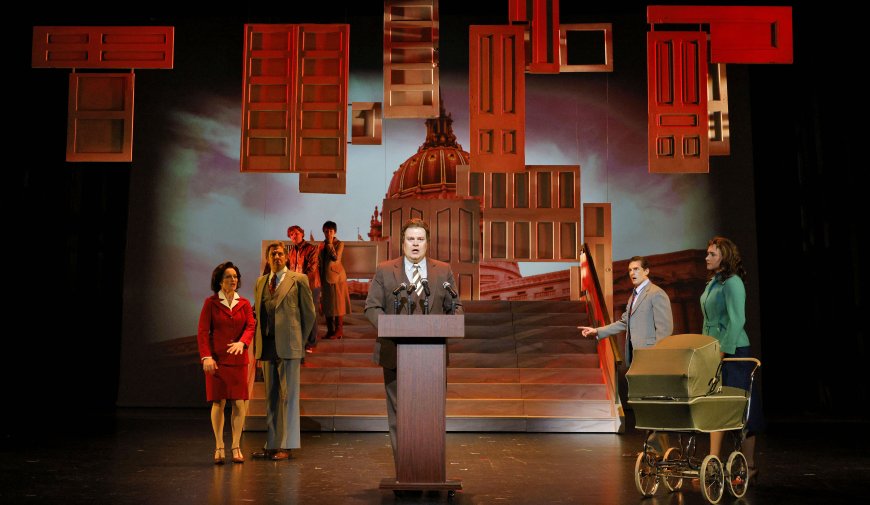
Korie has trimmed the libretto, which covers Milk’s life from his childhood to his assassination by fellow San Francisco supervisor Dan White. While he removed a swath of secondary characters and a good amount of repetitive text, the libretto manages to retain many interactions and scenes. Still, the result feels too compressed and overstuffed, crammed with so much incident in its two hours that Milk himself, here portrayed by the sweet-voiced baritone Michael Kelly, feels out of focus. There’s a lot of throat-clearing and scene-setting before his character is settled in San Francisco and running for office.
Wallace’s highly eclectic and fast-moving score contributes to the sense of trying to do too much. The revised opera starts with Harvey’s Mama, tenderly sung by mezzo-soprano Catherine Cook, lecturing her young son (a star turn by tenor Curtis Resnick) about the Holocaust and being Jewish over a choral setting of the Mourner’s Kaddish. Themes of identity overlap right from the beginning, as do musical styles.
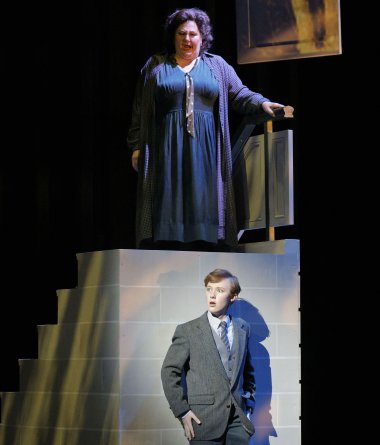
Mama also warns about “men who are different” and reminds her son to come home right after the opera he’s attending. From there, the score is constantly on the go, full of jagged rhythms and awkward text-setting. Sometimes this works — the scene with young Harvey at the opera, wondering who “Tessa Tura” might be, is hilarious and evocative — but more often it feels rushed.
Wallace requires that singers be amplified in his operas, but Ben Krames’s sound design is far too loud for the 800-seat theater. On opening night, the principal singers’ volume overwhelmed, blunting their portrayals and covering much musical detail in the 30-piece orchestra.
Harvey Milk Reimagined is at its best when it takes its time: in the scene introducing Milk’s lover Scott Smith, flamboyantly portrayed by tenor Henry Benson; in a loving late-night duet between Smith and Milk; and especially in the beautiful closing scene after Milk is murdered.
The revision casts the role of the Messenger as a countertenor rather than a baritone, and Matheus Coura’s supernaturally beautiful voice and striking presence in the part brought real magic to the close. Soprano Chea Kang as supervisor Henrietta Wong contributed a gorgeous solo there as well.
Act 2 is more focused and covers Milk’s emergence on the San Francisco political scene. Here his interactions with Mayor George Moscone, who was also murdered by White, and then-supervisor Dianne Feinstein provide insight into Milk’s character and strategic abilities. Bass Matt Boehler and soprano Marnie Breckenridge, respectively, eloquently brought these politicians to life, with Breckenridge’s additional brief turn as a Castro prostitute vividly jumping out of the mass of secondary characters. Tenor Christopher Oglesby’s chilling depiction of White went from aggrieved and homophobic to truly mad over the course of the opera.

Some choices made by the production team dull the work’s effectiveness. The opera starts in New York City, where Milk grew up and lived for most of his life, and concludes in San Francisco, but the stage design — consisting of sets of stairs that are deployed in various formations and numerous hanging doors — lacks any sense of place. The projected photos of both cities don’t quite do enough, leaving Castro Street feeling indistinguishable from Wall Street.
The doors unsubtly symbolize the closet, where you’d find most LGBTQ people in the 1970s. The sets shift constantly around the stage and limit what director Brian Staufenbiel can do with his cast, particularly in the frequent crowd scenes. On top of all this, the costuming and styling of several characters seem slightly off, especially noticeable against the real-life photos and film the production uses.
On Saturday, Nicole Paiement conducted with her customary sharpness and drive, though perhaps, in this case, less drive and more repose would have been to the opera’s benefit.
This story was first published in Datebook in partnership with the San Francisco Chronicle.


